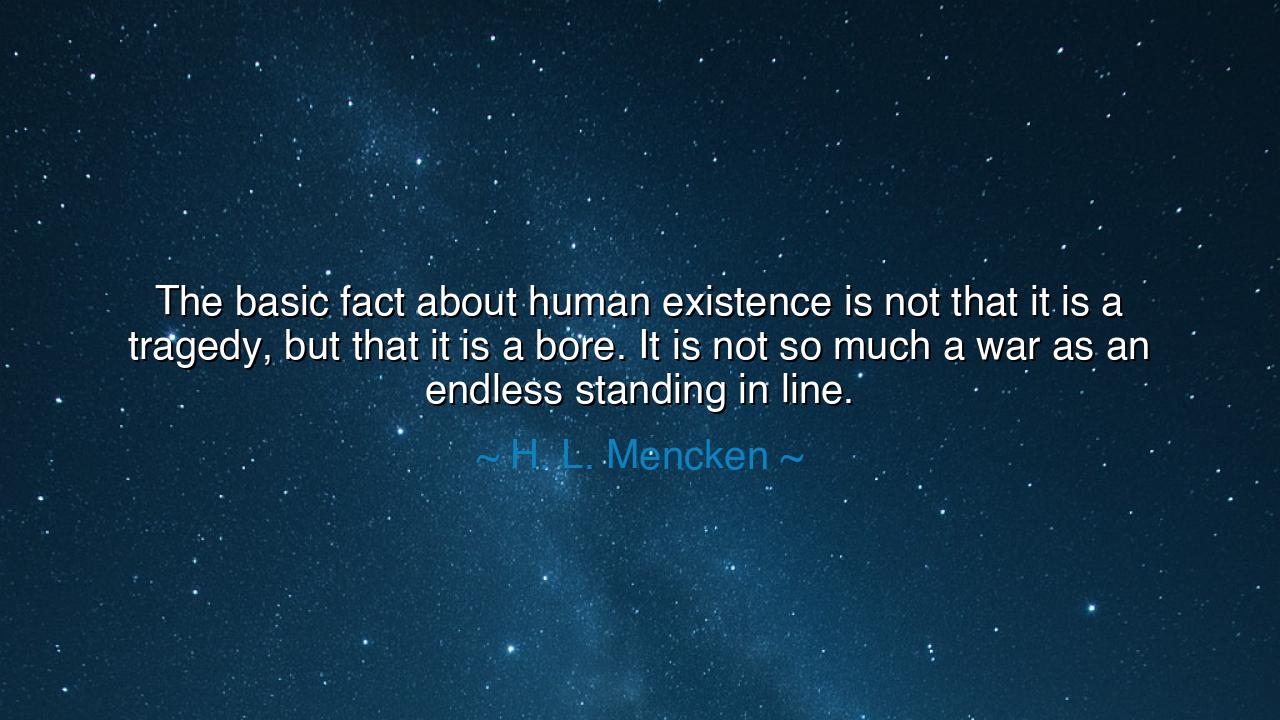
The basic fact about human existence is not that it is a tragedy
The basic fact about human existence is not that it is a tragedy, but that it is a bore. It is not so much a war as an endless standing in line.






“The basic fact about human existence is not that it is a tragedy, but that it is a bore. It is not so much a war as an endless standing in line.” – H. L. Mencken
In this sharp and ironic reflection, H. L. Mencken, the sage and skeptic of early twentieth-century America, strikes at the very heart of the human condition. His words, though clothed in wit, are heavy with insight: that the greatest burden of life is not always suffering, but monotony — not the drama of tragedy, but the slow erosion of meaning through repetition. Mencken, ever the realist, reminds us that while humanity dreams of grand battles and epic destinies, most of life is made of waiting — the endless standing in line, the quiet persistence of the ordinary. Beneath his satire lies a profound truth: that the greatest test of the human spirit is not heroism in crisis, but endurance in the everyday.
To understand the origin of this thought, we must remember Mencken’s time — the early modern age, when faith in progress and industry was colliding with the disillusionment of the modern soul. The world had witnessed wars, revolutions, and the rise of machines that promised convenience yet left many feeling empty. Mencken saw a paradox: mankind had conquered tragedy but fallen captive to boredom. The myths of struggle had been replaced by the rituals of routine. Where the ancients wrestled with gods and fate, modern man wrestled with clocks and bureaucracy. The endless line became the new battlefield — a symbol of society’s slow, mechanical order, where individuality withers under repetition.
And yet, his words do not simply mock humanity; they warn it. Mencken’s “bore” is not just the dullness of daily life — it is the spiritual stupor that arises when one ceases to seek meaning. It is the slow death that comes not from pain, but from indifference. The ancients called this condition acedia — the weariness of the soul that forgets to wonder. A man may survive tragedy, for it awakens his courage; but boredom numbs him, until he forgets he is alive. Thus Mencken’s irony hides a plea: to wake from our slumber, to see again the fire hidden in the ordinary, to resist the slow decay of spirit that comfort and conformity bring.
History offers many examples of this truth. Consider the story of Prince Siddhartha, who would become the Buddha. Surrounded by luxury, sheltered from pain, he found himself suffocated not by tragedy, but by emptiness. The golden walls of his palace were not prisons of suffering but of boredom. And it was this quiet despair that drove him to leave everything behind in search of enlightenment. His journey began not with loss, but with the realization that a life without meaning — no matter how easy or safe — is its own kind of death. Mencken’s words echo that same revelation: that the real danger of existence is not catastrophe, but comfort without purpose.
But there is another layer to Mencken’s vision — his humor. To call life an “endless standing in line” is to paint it with a kind of cosmic absurdity. He invites us to laugh at our condition, to see that much of human striving — the rush, the waiting, the competition — is often vain and cyclical. Yet in that laughter there is liberation. For if we can see the absurdity of it all, we are free to step out of the line, even if only in spirit. The ancients, too, knew this wisdom. The Stoics taught that while we cannot control the structure of the world, we can control our attitude toward it. To endure the mundane with grace, to find meaning in the unremarkable — this, too, is a form of victory.
The lesson is this: do not wait for life to become heroic before you live it. Do not imagine that greatness lies only in battle or glory. The true test of the soul is to find light in repetition, purpose in patience, beauty in the ordinary. When you stand in the long line of your days, do not curse the wait — look instead for the quiet miracle of being. Speak kindly to the stranger beside you; notice the sunlight through the window; remember that each moment, however small, is a fragment of eternity.
So, let Mencken’s irony awaken you, not to despair, but to awareness. Yes, life may often seem a line without end, an endless procession of sameness — but even there, meaning can be made. It is not tragedy that ruins us, but forgetfulness — the forgetting that life itself, even in its dullness, is a gift. Be the one who waits with eyes open. Be the one who finds wonder in the pause. For the secret of endurance is not to escape the line, but to live fully within it — to transform the ordinary into the extraordinary by the force of your attention.
Thus, the ancient truth endures: the gods do not dwell only in storms and fire, but also in the stillness of the queue, in the heartbeat of a single moment noticed, cherished, and made eternal.






AAdministratorAdministrator
Welcome, honored guests. Please leave a comment, we will respond soon